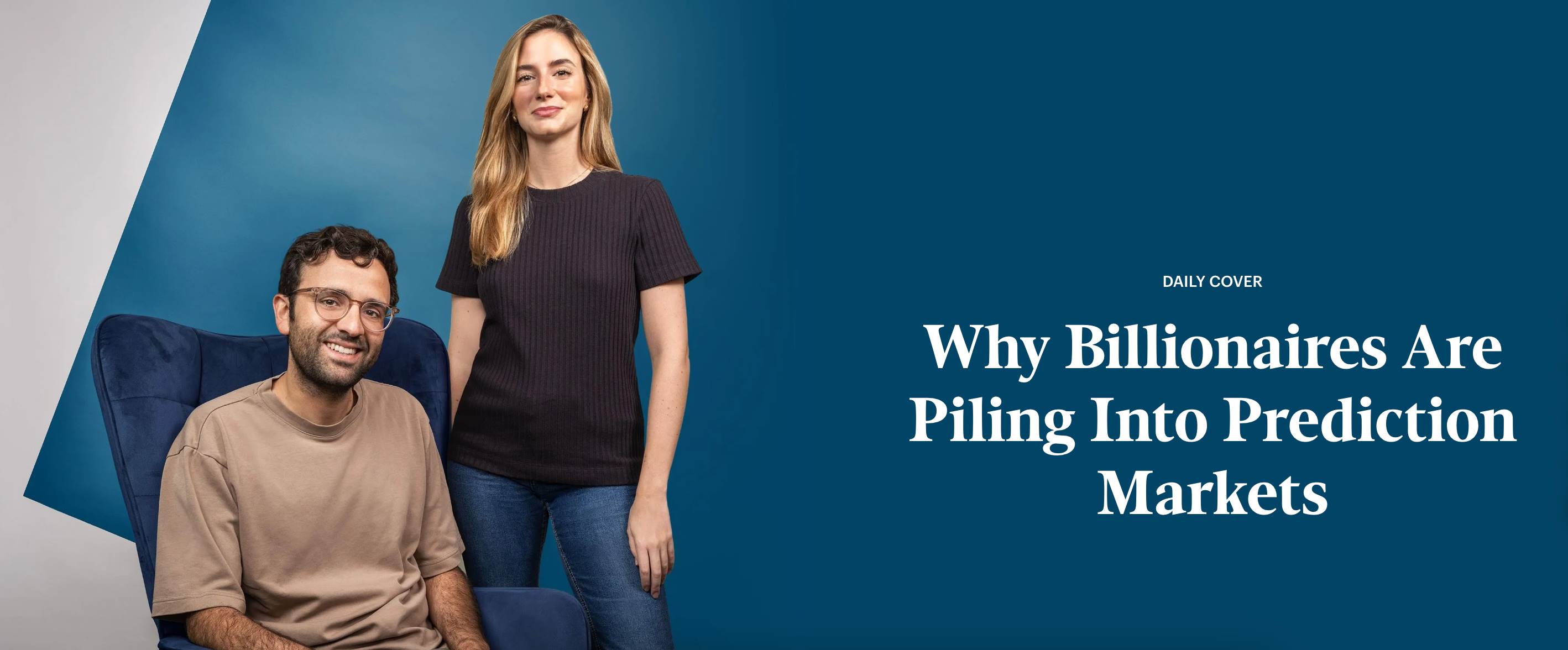作者:Alicia Park
编译:深潮TechFlow

最精明的亿万富翁交易员们正押注新兴的预测市场。Kalshi 凭借与特朗普阵营的关系,在这个可能价值万亿美元的机遇中占据了领先地位。
2023 年一个寒冷的冬日早晨,折扣经纪公司亿万富翁查尔斯·施瓦布(Charles Schwab)来到鲜为人知的预测市场初创公司 Kalshi 位于 SoHo 的办公室。
他手持几本看起来已经塞满的文件夹,这位华尔街传奇花时间深入研究这家小型企业的举动令 Kalshi 的两位 27 岁联合创始人塔里克·曼苏尔(Tarek Mansour)和卢安娜·洛佩斯·拉拉(Luana Lopes Lara)感到震惊。
两年前,施瓦布和另一位华尔街巨擘亨利·克拉维斯(Henry Kravis)曾对曼苏尔的公司进行天使投资,参与了一轮3000万美元的融资,使 Kalshi 的估值达到 1.2 亿美元。
“我第一次和查克通话几分钟后,他就说‘我想投资’,”29 岁的曼苏尔说。“他说这让他想起了创办嘉信理财(Charles Schwab)的时候,那是他很久以来第一次看到一家能够从根本上改变金融市场的公司。”
如今,Kalshi 是查克·施瓦布除了以他的名字命名的、市值 1760 亿美元的经纪公司之外最大的投资之一。今年 6 月,这家初创公司在一轮融资中估值 20 亿美元,吸引了另一位华尔街亿万富翁、Citadel 证券资深首席执行官赵鹏的关注。
施瓦布、克拉维斯和赵鹏的投资并非孤例。预测市场正成为金融界最聪明的亿万富翁的投资热点。
Interactive Brokers 创始人托马斯·彼得菲(Thomas Peterffy,净资产 720 亿美元)告诉《福布斯》,他曾在2021年 Kalshi 的天使轮融资后试图收购该公司。虽然被拒绝,但彼得菲并未气馁,他的 Interactive Brokers 于一年前推出了一个名为 ForecastEx 的子公司,与 Kalshi 展开竞争,预测的未来事件范围从纽约市市长选举到2025年底比特币价格。
2024 年 4 月,杰夫·亚斯(Jeff Yass)旗下规模达 650 亿美元的量化交易对冲基金 Susquehanna International Group 与 Kalshi 联手,作为其主要做市商之一提供流动性。近期,Kalshi 与弗拉德·特涅夫(Vlad Tenev)旗下规模达64亿美元的 Robinhood 合作,将事件合约交易添加到日益增长的零售投资产品中。
为了不被同领域竞争对手所超越,基于区块链的预测市场 Polymarket 吸引了众多亿万富翁的投资,其中包括 Palantir 联合创始人 Peter Thiel(253 亿美元)、以太坊创始人 Vitalik Buterin 和 Airbnb 联合创始人 Joe Gebbia(77 亿美元)。据 Pitchbook 称,今年 8 月,Polymarket 在 Thiel 的 Founders Fund 领投的 1.35 亿美元融资后估值达到 10 亿美元。Coinbase 创始人 Brian Armstrong(137 亿美元)也在 7 月宣布即将推出“万物交易所”(Everything Exchange),为其数百万客户提供预测市场服务。
据The Information报道,Kalshi 和 Polymarket 目前都在寻求新一轮融资,这可能会使其估值分别升至 50 亿美元和 90 亿美元。
对选举和体育赛事进行投注并非新鲜事:早在 19 世纪,这种形式就在美国存在,而现代预测市场——允许用户通过买卖“是”或“否”合约来押注未来事件的结果——最早于1988年在爱荷华大学被提出。
早期的预测市场,例如 Intrade 和 PredictIt,在 2010 年代就已经公开发行,但由于监管问题和缺乏吸引力而受到限制。尽管 Kalshi 并非首创,但它在去年10月创造了历史,一项联邦法院裁决授权 Kalshi 提供总统选举合约,创造了历史,而此前,这种合约在一个多世纪以来一直是非法的。
总统选举改变了游戏规则:在获得选举投注的监管批准后,Kalshi的用户群在不到一个月内增长了十倍,在选举之夜前夕,用户投注额超过 10 亿美元,达到 200 万。Polymarket 用户在特朗普或哈里斯身上的投注高达 36 亿美元。大选的势头使预测市场与文化息息相关,挖掘出一系列类似从明年奥斯卡提名人选到 Astronomer CEO 在酷玩乐队的演唱会巨型电子屏幕上拥抱后能性是否会离婚的无限投注机会。
如果你问亿万富翁交易员为什么他们想进入预测市场行业,你可能会得到很多高尚的回答:
“在我的整个职业生涯中,人们不从概率的角度思考未来一直让我感到困扰,”彼得菲说道。他的经纪公司规模达 1000 亿美元,最初成立于 1977 年,旨在让更多人交易期权或押注股票价格。“在我看来,预测市场是一种教会公众如何从概率的角度思考事物未来结果的方式。”
杰夫·亚斯经营着一家对冲基金,精通扑克几乎成了他的工作要求。他给《福布斯》发了这样一条信息:“预测市场可以让各方在参数基础上更有效地分担风险。
佛罗里达州房主面临的飓风风险就是一个例子。与其购买年度保险,不如在飓风来临时购买一份“确定”合同,根据最新的气象数据,预测所在城镇的风速将超过规定值,从而对冲潜在的财产损失风险。”
特涅夫在 X 上为 Robinhood 与 Kalshi 将于 2024 年 3 月达成的合作关系命名时写道:“从最根本的层面来看,[预测市场] 是资本主义在追求真理中的应用。市场激励和群体智慧会筛选所有信息,以确定特定问题的答案以及重要事件的结果。” 一个月前,Coinbase 的阿姆斯特朗(Armstrong)告诉 CNBC,预测市场有朝一日可能会成为《纽约时报》的替代品。
曼苏尔是一位麻省理工学院毕业的工程师,曾在高盛和Citadel证券从事股票期权交易。他直截了当地说道:
“如果你是华尔街的交易员,预测市场长期以来一直是你的圣杯。”
谈到这个拥有无限可交易产品的行业。“我们想打造全球最大的商业市场。”
如今,纽约市的 Kalshi 拥有 75 名员工,几乎是 2024 年 11 月大选前的两倍,并且随时提供约 2,000 个活跃市场。
从金融服务的角度来看,它以传统的方式赚钱,即从每份买卖的合约中收取佣金或费用。合约的价格与市场感知的事件概率挂钩,价格在 1 美分到 99 美分之间。例如,买一份 10 美分的合约,预测彼得·赫格塞斯将第一个离开特朗普内阁,费用就是 1 美分,相当于 10%的佣金。如果买 100 份“是”的合约,押注美国政府将在 2026 年关闭,根据公司的浮动费用公式,Kalshi 将获得 1.75 美元,也就是 3.5%的佣金。Kalshi 还对所有借记卡存款收取 2%的手续费,并从您的账户中提取奖金则收取2美元的固定费用。
但浮动费用并非 Kalshi 吸引亿万富翁支持者的唯一原因。与可替代的股票不同(股票可以在任何数量的经纪公司交易和结算),预测市场中的合约是专有的,有效地创建了一道护城河,将用户锁定在创建市场的平台上。
Kalshi 目前月交易量约为 10 亿美元,自成立以来已处理总交易量 69 亿美元,其中 64 亿美元来自 2024 年 10 月。这家初创公司不仅直接在其网站和移动应用程序上吸引投机者,还将市场白标给 Robinhood 和 Webull 等经纪商,从而增加了流动性和规模。曼苏尔表示,公司明年将新增十几家经纪商。
“我们发现,预测市场是一个非常好的互动工具,”Robinhood 期货主管 JB Mackenzie 表示。Robinhood 拥有 2700 万客户,致力于成为下一代的一站式理财公司。“它有助于交叉推广我们公司内的其他业务。”
加密货币风险投资公司 Paradigm 的创始合伙人 Matt Huang 于今年 6 月领投了 Kalshi 的 1.85 亿美元融资。他认为,低运营成本可能有助于预测市场有效蚕食其他成熟市场。“预测市场是所有其他市场的超集:你可以将体育博彩、股票市场以及几乎所有其他市场重新归类为预测市场,” Huang 说道。“从某种意义上说,预测市场可能会发展到与最大的金融市场一样大,甚至更大。我真的认为它们的潜力是无限的。” 对曼苏尔来说,这个机会的规模是“数百万亿美元”。
如果预测市场热潮能够得到更多助力,很可能来自特朗普阵营。特朗普总统的长子小唐纳德·特朗普 (Donald Trump Jr.) 于今年1月加入 Kalshi ,担任战略顾问。此前曾担任 Kalshi 首席监管官四年的埃利泽·米肖里(Eliezer Mishory),被任命为特朗普政府效率部负责人。 Kalshi 董事会成员布莱恩·昆滕兹(Brian Quintenz)曾在特朗普第一届政府期间担任美国商品期货交易委员会(CFTC)委员,今年早些时候被特朗普任命为 CFTC 负责人。
在提交给《福布斯》2022年“30位30岁以下精英”提名的申请中,曼苏尔将 Kalshi 天使投资者 Emil Michael(特朗普提名的国防部首席技术官)列为他唯一的专业推荐人选。此外,查尔斯·施瓦布的孙女萨曼莎·施瓦布(Samantha Schwab),除了在特朗普政府工作外没有其他专业工作经验。据她的领英页面显示,她曾在 Kalshi 的业务开发团队工作了一年,之后于今年 1 月加入美国财政部担任副幕僚长。
尽管 Kalshi 在预测市场中占据领先地位,但这场竞争仍需继续。
8 月底,小唐纳德·特朗普 (Donald Trump Jr.) 投资了 Kalshi 的竞争对手 Polymarket,并加入了其顾问委员会。几天后,Polymarket 获得美国商品期货交易委员会 (CFTC) 的批准,在美国上市,使其在渗透华尔街的能力上与 Kalshi 不相上下。美国最大的体育博彩平台 Fanduel 和 Draftkings 也在开发自己的预测市场,而州监管机构仍在就 Kalshi 的体育赛事合同的合法性提起诉讼——这是该公司迄今为止最大的市场。敬请关注。
免责声明:本文章仅代表作者个人观点,不代表本平台的立场和观点。本文章仅供信息分享,不构成对任何人的任何投资建议。用户与作者之间的任何争议,与本平台无关。如网页中刊载的文章或图片涉及侵权,请提供相关的权利证明和身份证明发送邮件到support@aicoin.com,本平台相关工作人员将会进行核查。




